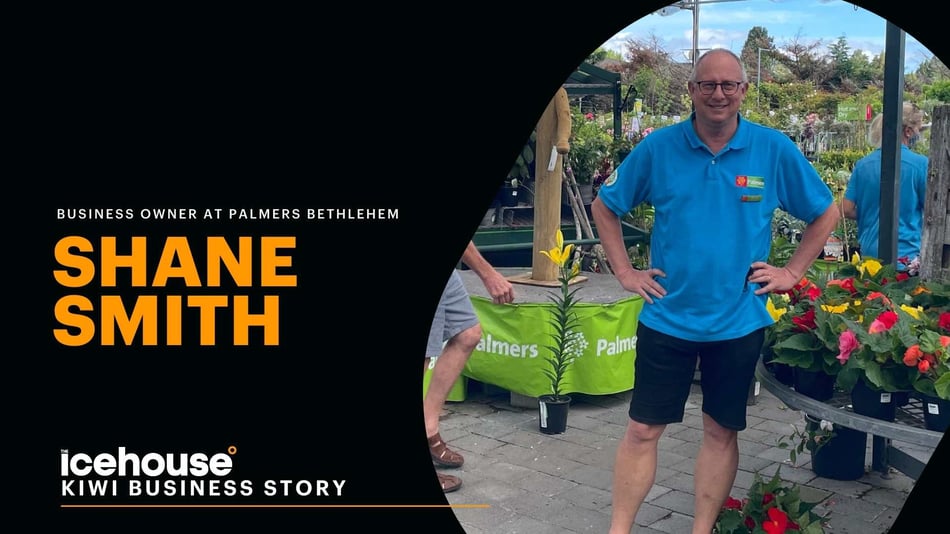
Shane Smith from Palmers Bethlehem is an Owner Manager Programme (OMP) 53 cohort alumni.
This Kiwi Business Story is based on a podcast from 16 December 2021, and all figures quoted are from that time. You can enjoy the complete podcast here..jpg?width=1140&name=Kiwi%20Business%20Story_Image%20(33).jpg)
Tell us about your journey into business ownership and why Palmers for you?
It is an interesting story. I classify myself as an accidental business owner. I am a career banker, and one day someone wanted to buy Palmer's in Bethlehem. After getting them their appropriate approval, for assorted reasons, they decided not to go ahead with the purchase. The broker involved initially blamed me and I hit a throwaway comment saying, “I love this business, even I would buy it”. Three weeks later, the broker came back and asked me if I was serious, and I stuttered and stammered, “I'm not sure”, “maybe yes”, “kind of”. Three or four months later, we were the owners.
So, we were not actively looking for a business, but Palmers did resonate with a few things. Unbelievably, about 30 years ago, my wife and I said, if we were going to own a business, we would like to own a garden center. That was just a young couple's dream, rather than anything real. Palmer's itself had quality, a brand, the business had scale, which resonated with me.
What does the business specialise in?
First, we are a garden center. Most of our business, 65%, is green, the plants, bits, and pieces. We have expanded our business into other markets, such as we have a big leisure department now, we even sell spa pools. We are the Tauranga only specialist Webber dealer. We are attracting that whole lifestyle approach, and there is no point just selling them roses. Selling the other things that they want to enjoy in their gardens and around the home too. Some garden centers have morphed more to leisure, and a little bit less on the garden center. We are staying true to our roots, which is garden center first, all other things second.
What is a piece of advice that you would have given yourself at the start of your Business Ownership journey, knowing what you know now?
The first idea would be to not buy a garden center business and settle in the busiest month of the year. For about the first two weeks of starting the business. I just stood there, and my mouth was open trying to work out what was going on. I can read a spreadsheet and a balance sheet and so on, but what I did not do is have the comprehension of the planning of how many seedling plants come in. How many, we sell 4500 Roses a year, a sizable chunk of them we plant and, pot, counting, stacking and those sorts of things. I did not understand the logistics part, so that was a mind bender. Once you have the systems in place, or understand the systems that are in place, it makes everything much easier. We have such cool staff here that know what to do.
How did you hear about The Icehouse? And what was your first point of contact?
I was working at BNZ, a partner of The Icehouse. Over the years, I have encouraged my clients to go on OMP and other programmes. After three years into the business, I decided that it was time to spend some money on myself and try and develop myself and skills further. You do not know, what you don't know. I knew from the feedback from my customers the value that they got out of it. We started this year saying this was the year of being comfortable with being uncomfortable. Sort of our little mantra quote. This was part of that promise to challenge myself and to do something different.
Has there been anything that you have implemented into your business and your lifestyle since the first couple of blocks on the programme?
The first thoughts I had when I was going on The Icehouse would be how much knowledge I was going to get from the facilitators, but where the values come in is how much knowledge I am getting from the other participants and their individual experiences. When you are sitting round the table and there is a guest speaker, everyone chips in, and you hear everyone's unique experience and how they responded to certain issues or even things they did for their staff to help. These ideas, I bought back little bits and pieces. Another would be hiring someone that can take a lot of the work jobs off me, which lets me do some of the things that I want to do. The biggest thing for me would be setting up a long-term goal and working on achieving it every day.


